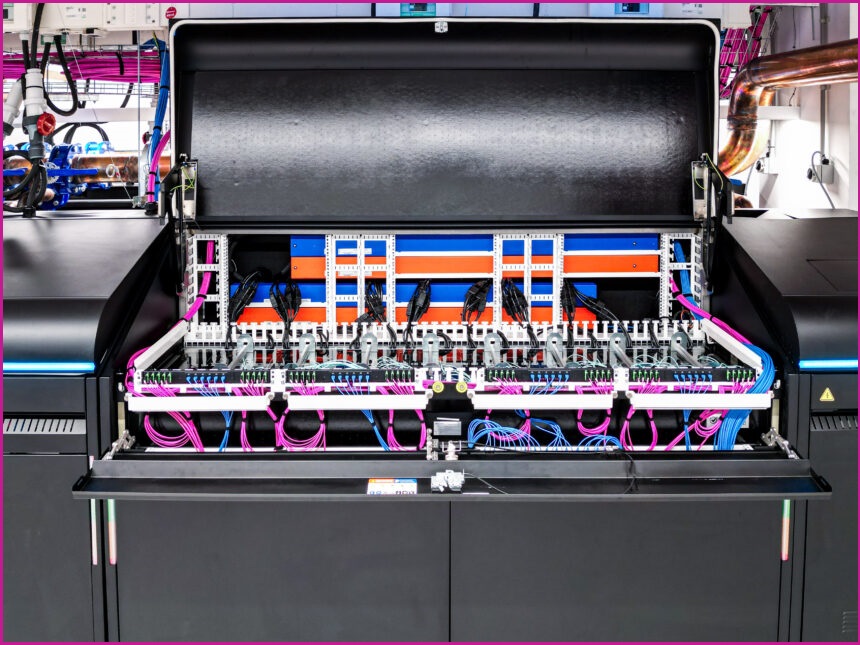![[L to R]: ResetData CEOs Bass Salah and Marcel Zalloua with the new supercomputer in Melbourne.](https://www.newsbeep.com/uk/wp-content/uploads/2025/08/ResetData_Bas Salah and Marcel Zalloua_Sydney Demonstration Lab.jpg)
[L to R]: ResetData CEOs Bass Salah and Marcel Zalloua with the new supercomputer in Melbourne.
One local AI developer will win $1 million worth of AI compute in a competition announced at the launch of Australia’s fastest AI supercomputer, a ResetData-built system that uses NVIDIA H200 chips to run AI-specific calculations twice as fast as existing supercomputers.
Built in Melbourne’s CBD with the backing of Centuria Capital Group, the AI-F1 system “marks Australia’s arrival as a true AI powerhouse,” ResetData joint CEO Bass Salah said in debuting a platform built to give governments and businesses access to “Australia’s AI future”.
Based on thousands of NVIDIA H200 Tensor Core graphics processing units (GPUs), the system is Australia’s largest supercomputer built as a cluster of GPUs, whose characteristics are well suited to the massive, parallel number-crunching that efficiently trains AI models.
It is Australia’s most powerful ‘AI Factory’ – an NVIDIA concept that integrates GPUs with the supporting infrastructure to make AI work as efficiently as possible – and can churn through AI calculations twice as quickly as general-purpose supercomputers like Gadi and Setonix.
The system was initially designed to support high performance computing (HPC), visualisation and digital twin capabilities, but ChatGPT’s emergence in 2022 fundamentally changed its direction, Salah told Information Age.
“When ChatGPT came along, we saw that it was a really easy pivot for us to go from that GPU-as-a-service infrastructure for simulation, to GPU-as-a-service infrastructure for AI large language model [LLM] tokenisation,” he explained.
Over the past 12 months, ResetData ramped up partnerships to build “the whole value chain” of an AI-as-a-service ecosystem – including a sovereign AI Marketplace that Australian developers can use to sell agentic AI tools or other purpose-built AI systems.
Rather than buying AI infrastructure, Salah said, customers “come to us with problem statements for business use cases…. We had already built all the infrastructure, but the more complex move was about creating a sovereign AI service layer for customers to consume.”
Stimulating Australian AI development
As well as its AI processing grunt, ResetData has positioned AI-F1 as a platform for what Salah called “actual, meaningful impact” to support Australian industry – and is backing it with a national competition, that will run through 30 September.
The top prize, which will be announced at the Sydney SXSW Festival in October, is $1 million worth of usage credits for the AI-F1 system, which will give local developers wide latitude to build and test AI applications on blocks of up to 1,024 NVIDIA H200 GPUs.
“What became evident to us is that now we’ve got this capability, how do we actually use it for purpose?” Salah said, ruing the dominance of overseas cloud giants and flagging AI-F1’s potential for “actual, meaningful impact… focused on being a sovereign capability.”

ResetData says its supercomputer will be used for “actual, meaningful impact” to support Australian industry. Photo: Supplied
Even as government and businesses both support and warn about AI guardrails, Salah believes surging demand for AI services – especially autonomous ‘AI agents’ that are rapidly taking over decision-making – will reinforce the importance of sovereign AI capabilities.
Innovative Australian AI companies “can build these AI software solutions in our environment, then deploy them on our infrastructure,” he said, adding that ResetData was poised to increase AI-F1’s compute capacity “significantly” in the next two years.
Such investments support the increasing focus on AI as a driver for national growth – a theme of the recent Treasury roundtable – but maintaining that growth will require local operators to compete for resources in a top-heavy industry dominated by big tech giants.
One recent estimate found Google, Microsoft, Meta and Amazon have the equivalent of hundreds of thousands of NVIDIA H100 chips – a lower-powered cousin of the H200 – and the world’s most powerful AI supercomputers are hoovering up the chips at breakneck pace.
Staking out a corner in the global AI ecosystem
AI-F1 isn’t the only new system bolstering Australia’s AI number-crunching capabilities: Monash University this month announced a partnership with NVICIA, Dell Technologies and CDC Data Centres to build a university-focused AI supercomputer called MAVERIC.
Designed to support Monash researchers and partners, that system – due to go live next year – will use a closed-loop liquid-cooling system 300 times more efficient than widely-used water cooling, while AI-F1 uses liquid-immersion cooling that’s over 100 times as efficient.
Scaling, powering and cooling AI data centres remain intractable challenges in a global AI market that is testing the industry’s financial and technological resources.

![[L to R]: ResetData CEOs Bass Salah and Marcel Zalloua with the new supercomputer in Melbourne.](https://www.newsbeep.com/uk/wp-content/uploads/2025/08/ResetData_Bas20Salah20and20Marcel20Zalloua_Sydney20Demonstration20Lab-1843x1024.jpg)